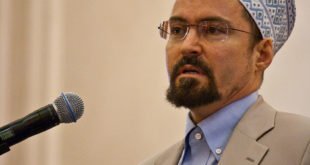This paper was presented at the Broadcast Education Association's annual convention in April 2004, where the author participated in a panel organized by the association's International Division. The dark desert night is alight with streaks of blue and red streaming across the sky. A mosque is the symbol-laden backdrop for …
Read More »Islamic Satellite Channels and Their Impact on Arab Societies: Iqra Channel-a Case Study
This paper was presented at a conference organized by The Centre of Middle Eastern and Islamic Studies at the University of Cambridge on "Arab Satellite Broadcasting in the Age of Globalization" held 1-3 November 2002 and is reproduced with the permission of The Cambridge Arab Media Project. This version has …
Read More »The Proposed Satellite Television Channel of the Organization of the Islamic Conference: A Response to Moral Panic?
I. INTRODUCTION The Organization of the Islamic Conference (OIC) held its ninth conference in Doha, the Qatari capital, during November 2001. Members decided to establish an Islamic English-language satellite television channel. The main aim of such an initiative is apparently to educate the West about "real Islam," in light of …
Read More »Not Every Picture Tells a Story: A Death in Falluja
This article first appeared in The New York Times. All of life seems to be about denial--the denial of death, the denial of reality, the denial of everything that is convenient for us to deny. Photography, because of its causal relationship to the world, seems to give us the truth or …
Read More »Two Entertainment Issues Preoccupy Egyptian Press in Ramadan
Reprinted from Al Hayat, 7 November, 2004, p.21, with permission. This year's Ramadan brings in its train, as usual, hundreds of serialized dramas, talk shows, and other standard format programs of the sort that increase year after year as a result of the burgeoning number of Arab satellite channels. What is …
Read More »Al Jazeera Update: More Datelines from Doha and a Code of Ethics
In a fast-changing world, easy observations remain in consciousness long after they have become invalid. So it is with the conceit that Al Jazeera put Qatar on the map and not visa versa, or the variant that Al Jazeera is more important as a regional power than the State of …
Read More »New Generation Camcorders
Camcorders have undergone major changes in the last year or two, perhaps more than at any time since their introduction in the late 1970s. These changes affect higher end professional models and even the affordable three-CCD (charged coupled device), with DV models costing only a few thousand US dollars. The …
Read More »Issue 13: Letter from the Publishers
Over the past six years Transnational Broadcasting Studies has established itself, even as an e-journal, as the niche publication in the ever expanding field of Arab satellite broadcasting and has been greatly appreciated by both scholars and professionals. Ever increasing convergence of satellite, Internet, digital, and wireless technology means that transnational broadcasting …
Read More »On a Journey with Hamza Yusuf
Hamza Yusuf Hanson was born in Walla Walla, Washington, and raised in northern California. He became Muslim in 1977 in Santa Barbara, California and subsequently moved to the Middle East and studied Arabic and Islam for four years in the United Arab Emirates and later in Medina, Algeria, Morocco, and …
Read More »Amr Khaled: Broadcasting the Nahda
In the aftermath of the attacks of September 11, 2001, renewed fears about the threat of "Islamic Fundamentalism" conjured images of bearded and turbaned zealots spoiling for holy war against the West. More than three years later, such stereotypes seem confirmed in the grim reality of the morning's headlines, as …
Read More » Arab Media & Society The Arab Media Hub
Arab Media & Society The Arab Media Hub


